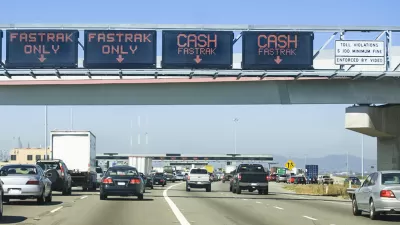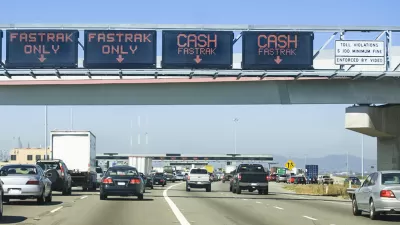The Washington Post editorializes against the use of general funds to fill the Highway Trust Fund shortfall ($18 billion annually), whether they be dedicated funds or offsets, and evaluates proposals from President Barack Obama and House Republicans.

In contrast to a recent op-ed that advocated using dedicated general funds revenue to fund transportation (posted here) and one senator's proposal to insist that use of general funds be offsetted, this editorial strongly makes the case for relying on user fees as has been the case since 1956.
"It is both efficient and fair to require drivers to pay according to the amount they exploit and degrade the roads," writes The Washington Post Editorial Board. "This discourages overuse rather than subsidizing big-time road users," they add.
The smart and obvious way to fund federal transportation policy is to create a steady, long-term funding source to finance multi-year projects, one that relies on fees from users — such as a higher gas tax or a vehicle-miles tax.
"The latest news is that House Republican leaders are drawing up a measly one-year trust fund fix [also posted here: "Buy a Stamp—Patch a Highway?"], which would conveniently push tough revenue choices past this year’s election," they write. However, Politico's Adam Snider indicates that's a no-go in the Senate - from at least one powerful Republican.
"I know they're trying to come up with a way to do this on a short-term basis. Ultimately we've got to get to a longer-term solution," Senate Commerce ranking member John Thune (R-S.D.) told MT.
The editorial is more direct, stating that House Republicans would take 10 years of savings (by ending Saturday delivery) "to pay for that one year of proposed highway spending," showing just how great a strain transportation is on the federal budget compared to other services.
President Obama's funding proposal, the Grow America Act, actually meets Sen. John Thune's criteria by providing four years of funding with a "one-time windfall from corporate tax reform," though it would not make for "smart transportation policy."
In fact, the editorial supports the funding mechanism of both proposals, i.e. ending Saturday postal service and corporate tax reform, but it opposes using them "to jury-rig the highway budget with unrelated 'offsets'". The editorial concludes with this warning:
If the nation’s leaders are too cowardly to make obvious policy choices this year, they will have to develop some backbone before the next self-imposed transportation funding crisis. At the rate we’re going, that won’t be so long from now.
FULL STORY: Congress detours from common sense on the Highway Trust Fund

Maui's Vacation Rental Debate Turns Ugly
Verbal attacks, misinformation campaigns and fistfights plague a high-stakes debate to convert thousands of vacation rentals into long-term housing.

Planetizen Federal Action Tracker
A weekly monitor of how Trump’s orders and actions are impacting planners and planning in America.

In Urban Planning, AI Prompting Could be the New Design Thinking
Creativity has long been key to great urban design. What if we see AI as our new creative partner?

King County Supportive Housing Program Offers Hope for Unhoused Residents
The county is taking a ‘Housing First’ approach that prioritizes getting people into housing, then offering wraparound supportive services.

Researchers Use AI to Get Clearer Picture of US Housing
Analysts are using artificial intelligence to supercharge their research by allowing them to comb through data faster. Though these AI tools can be error prone, they save time and housing researchers are optimistic about the future.

Making Shared Micromobility More Inclusive
Cities and shared mobility system operators can do more to include people with disabilities in planning and operations, per a new report.
Urban Design for Planners 1: Software Tools
This six-course series explores essential urban design concepts using open source software and equips planners with the tools they need to participate fully in the urban design process.
Planning for Universal Design
Learn the tools for implementing Universal Design in planning regulations.
planning NEXT
Appalachian Highlands Housing Partners
Mpact (founded as Rail~Volution)
City of Camden Redevelopment Agency
City of Astoria
City of Portland
City of Laramie



























